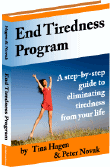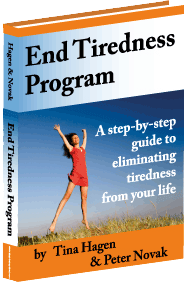Conditions That Cause Tiredness
What conditions are the major causes of tiredness and what measures can you take to help yourself recover from fatigue?
Major conditions that can lead to fatigue
There are a number of conditions that cause tiredness, including chronic fatigue syndrome, sleep disorders, heart disease, cancer, adrenal exhaustion and hypothyroidism. Underlying most of these conditions are three important factors, which, if you become aware of them, will aid recovery. They are: reducing stress, choosing excellent nutrition (and refusing junk and fast food) and getting enough high quality sleep.
Many people have more than one condition. For example, people who have chronic fatigue syndrome sometimes have some form of sleep disorder. Treating the sleep disorder will help you recover faster and more effectively.
Tiredness is insidious. Usually it creeps up on us slowly, making its presence more and more felt, until our lives become increasingly affected by it. These feeling of being always tired are often accompanied by depression which worsens the situation even further. It becomes a vicious circle, and one that’s essential to break as quickly as possible.
Here are the main conditions which cause tiredness:
Chronic fatigue syndrome (CFS) and Fibromyalgia (FMS)
Not all fatigue is chronic fatigue. CFS, sometimes known as CFIDS, has a range of symptoms, including lowered immune function, poor digestion and absorption and sleep, which is either interrupted or not refreshing. Fibromyalgia, or aches, are often part of the syndrome as are fevers, headaches and profound exhaustion.
Candida (yeast -like fungus infection) is often involved with CFS, as is frequently adrenal fatigue and occasionally hypothyroidism.
[Please see Chronic fatigue syndrome for more detail.]
Sleep disorders
Sleep disorders vary. Some affect your quality of sleep, making you wake up in the middle of the night or otherwise interrupting your sleep cycles. Others will affect your ability to fall asleep in the first place. Please see the section below about general sleep lifestyle factors as these apply to all sleep disorders.
The specific sleep disorders are:
- SDB (Sleep-disordered breathing), which includes UARS (Upper Airway Resistance Syndrome) and sleep apnea. Both these conditions affect the passage of oxygen into the lungs during the night. People with sleep apnea tend to be overweight and male, while UARS affects people of any weight and the ratio of men to women sufferers are about 50/50. There are a number of treatments for both conditions.
- Narcolepsy – this disorder makes you feel exceedingly drowsy during the day. Insomnia is often present at night. Narcolepsy can be treated with stimulants e.g. Adderall, Ritalin, or Dexedrine.
- Restless leg syndrome (RLS) causes you to move your legs continuously at night. If you wake with a very untidy bed, or having disturbed your partner, you may have it. There are both natural and nutritional treatments for RLS.
[Please see Sleep Disorders that can make you tired for more detail.]
Chronic illness (e.g. heart disease, cancer etc)
Certain illnesses can have fatigue as one of their symptoms. These include: heart disease, cancer, endocrine and kidney diseases, and autoimmune disorders. Your doctor will probably want to rule these out so that your fatigue can be treated as quickly as possible.
[Please see Chronic conditions that cause fatigue for more detail.]
Adrenal fatigue
Adrenal exhaustion occurs when a person is chronically stressed as frequently happens in modern day living. The adrenal glands produce hormones to help you in times of extreme physical danger. Adrenaline helps you to fight or run away. But the adrenals are not set up to keep manufacturing adrenaline all the time, and they become overtaxed, causing extreme fatigue. The effects are not just limited to tiredness, however. The immune system works less and less well, making opportunistic infections more likely.
[Please see Overview of adrenal fatigue for more detail.]
Hypoglycemia
Hypoglycemia occurs when you eat too much sugar or high glycemic index foods. This causes your blood sugar to spike, releasing insulin. This, in turn, makes your blood sugar fall very fast, and then the adrenal glands produce cortisol and adrenaline.
[Please see Hypoglycemia and fatigue for more detail.]
Hypothyroidism
The thyroid controls the body’s metabolic rate. If the gland produces too little hormone, you will put on weight, become both physically and mentally sluggish, feel cold, and become tired all the time. The main causes of hypothyroidism are deficiency of nutrients, toxicity (especially fluoride), alcohol, and infection of the intestinal tract by parasites or yeast.
[Please see Relation between hypothyroidism and tiredness for more details.]
Depression
Depression can be caused by tiredness, poor sleep or nutrition, difficult circumstances and life stress. On the other hand, tiredness can be a result of depression, so it can become a vicious circle, which it’s important to break. You may need to take medication for a short time, or else pay close attention to nutrition. Any lifestyle changes and taking up relaxation that can help you reduce stress will pay huge dividends.
[Please see Tiredness and depression for more details.]
Lifestyle changes which will help you overcome tiredness
The following lifestyle changes will assist you, whatever the cause of your tiredness:
- Reduce stress by making changes to your work/life balance and simplifying or downsizing if necessary.
- Practice relaxation and/or meditation techniques as often as you can.
- Create a good sleeping environment by making your bedroom dark, quiet and cool.
- Make a ‘quiet hour’ before bed with a warm bath, some uplifting reading or music and avoid television during this time,
- Make exercise a habit, preferably daily. Walk for 20 minutes, or swim, or do a gentle yoga practice or stretching.
- Avoid junk and fast foods as these put your body under stress. Make good nutrition a priority.
When you are suffering from tiredness, try to put yourself at the center of your own life and make choices that will help you to recover.







